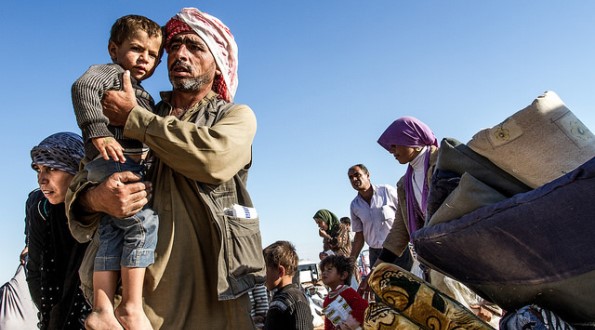BECOME A MEMBER
>JOIN
UK Parliament’s Defense Committee Publishes Report on ISIS

The UK can and should be playing a greater role in the fight against ISIS, says the UK Parliament’s Defense Committee in its report "The situation in Iraq and Syria and the response to al-Dawla al-Islamiya fi al-Iraq al-Sham (DAESH)" published in early February.
The Committee emphasized that they are not calling for combat troops to be deployed. However, the UK has the expertise, and resources to play a much larger role in analyzing the DAESH threat, contributing the plan to defeat them, supporting the Iraqi forces, and encouraging a political solution.
Chairman of the Committee, Rory Stewart MP, says:
"The nightmare of a jihadist state establishing across Syria and Iraq has finally been realised. DAESH controls territory equivalent to the size of the UK, has contributed to the displacement of millions, destabilising and threatening neighbouring states, and providing safe-haven to an estimated 20,000 foreign fighters, many dedicated to an international terrorist campaign. Yet, the role that the UK is playing in combating it, is strikingly modest."
Lack of clear objectives and expertise
The Committee was shocked by the inability or unwillingness of any of the Service Chiefs to provide a clear, and articulate statement of the UK’s objectives or strategic plan in Iraq. There was a lack of clarity over who owns a policy—and indeed whether such a policy exists. The Committee also established that the UK has so far conducted only 6 per cent of the air-strikes against DAESH; and discovered on its December visit to Iraq that there were only 3 UK military personnel outside the Kurdish regions of Iraq (compared to 400 Australians, 280 Italians and 300 Spanish). Despite the UK’s long involvement in Iraq, there were no UK personnel on the ground with deep expertise in the tribes, or politics of Iraq, or a deep understanding of the Shia militia, who are doing much of the fighting.
Obstacles
The report outlines the very significant obstacles facing any mission in Iraq, including the weakness of the Iraqi military, the deep polarisation between Shia and Sunni communities, and the antagonism between regional players, and wonders whether a strategy of degrading, containing and making ineffectual rather than destroying DAESH would not be a more realistic and immediately achievable aim and strategy. It argues that both the Peshmerga and the Iraqi Security Forces are in need of structural reform.
Recommendations for UK action
The report recommends that the UK invests heavily in staff to develop a better understanding of the situation on the ground, and to help shape a realistic coalition plan for dealing with ISIS. It argues that once the Iraqi Security Forces and the Peshmerga show increased capability and are ready for major offensives against DAESH, the UK should be prepared to provide an increased level of support to those operations from the air. It recommends that the UK should meet the request from the Iraqi army to provide training in counter-IED skills. The Committee also recommend significantly increased diplomatic and defence engagement with the key regional powers—particularly Turkey, Saudi Arabia and Iran—to develop a much more detailed understanding of the potential benefits and challenges of a regional solution. […]
Such activities as suggested by the Committee would require only the deployment of a few hundred personnel, the cost would be relatively modest, and it would not entail the risks inherent in deploying UK troops in combat roles. [...]
Chairman of the Committee, Rory Stewart MP, says: "We must clearly acknowledge the previous failures in Iraq, and reform our approach. But that does not mean lurching to doing nothing. The UK should find a way of engaging with Iraq which is moderate, pragmatic, but energetic. There are dozens of things the UK could be doing, without deploying combat troops, to work with coalition partners to help address one of the most extreme threats that we have faced in the last twenty years."
Click here for the full executive summary.
Photo courtesy of Sebastian Backhaus.

